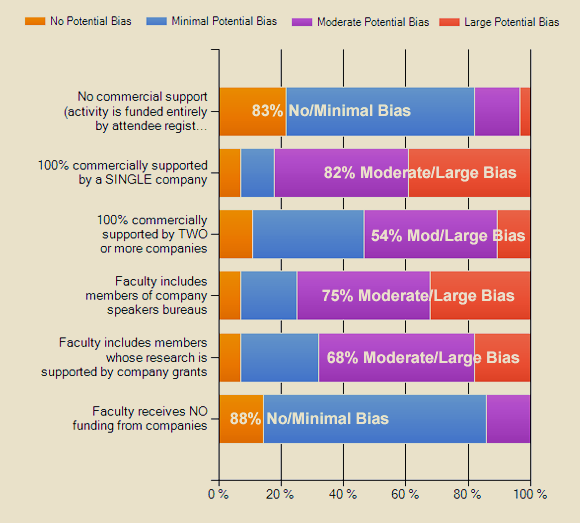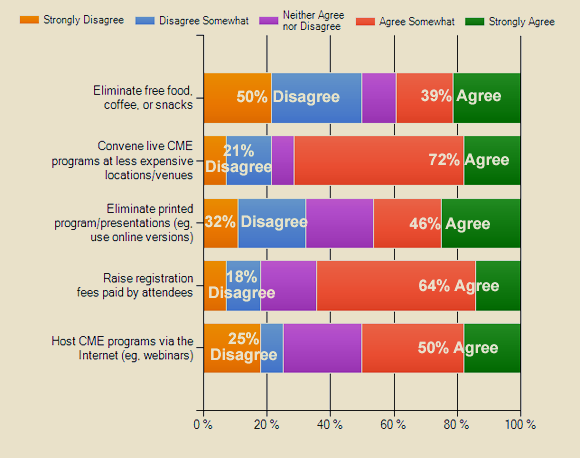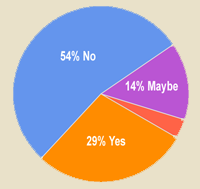Potential for Bias in Commercially Supported CME (Survey ran from 9 May 2011 through 13 September 2011. N = 200)
See Resources & Further Reading below…
Physicians are required to earn Continuing Medical Education (CME) courses to earn credits and maintain their state licenses. Currently, approximately 50% of accredited CME expenses are paid by pharma/medical device companies (see Pharma Support for Accredited CME Continues to Decline). Many critics of company-supported CME believe this support leads to “bias;” meaning that information presented at company-supported CME events favors the perspective of the program supporter or predominantly includes clinical data favorable to products of the CME supporter.
Between 9 May 2011 and 13 September 2011, readers of Pharma Marketing News were asked to answer a few short questions relating to potential bias in continuing medical education (CME) programs supported by pharma/medical device companies and how to limit the need for industry funding of CME. The results are summarized below.
Survey Results:
The overall results are summarized in charts below. You can view a more detailed Summary of Responses plus view comments from respondents: here.
For each of the following CME funding scenarios, please indicate what you believe to be the level of potential bias. “company” = pharmaceutical or medical device manufacturer. (Response ranges: No potential bias, Minimal potential bias, Moderate potential bias, Large potential bias):
- No commercial support (activity is funded entirely by attendee registration)
- Faculty receives NO funding from companies
- Faculty includes members whose research is supported by company grants
- 100% commercially supported by a SINGLE company
- Faculty includes members of company speakers bureaus
- 100% commercially supported by TWO or more companies

Several suggestions have been put forward to limit the need for commercial support of CME. Please indicate your level of agreement or disagreement with the following suggestions. (Response ranges: Agree Strongly, Agree Somewhat, Disagree Somewhat, Disagree Strongly, No Opinion):
- Convene live CME programs at less expensive locations/venues
- Eliminate free food, coffee, or snacks
- Eliminate printed program/presentations (eg, use online versions)
- Host CME programs via the Internet (eg, webinars)
- Raise registration fees paid by attendees

The Accreditation Council for Continuing Medical Education (ACCME) is seeking comment on a proposal that would prohibit the use of corporate logos and the mention of corporate divisions in disclosures of commercial support (see See Resources & Further Reading below…). ACCME specifically seeks comment on changing its policy to state: “The provider’s acknowledgment of commercial support as required by SCS 6.3 and 6.4 under Standard 6 of the ACCME Standards for Commercial SupportSM must only state the name of the company supplying the commercial support, in text format only. Disclosure cannot contain corporate logos and cannot mention or describe any other units within the commercial interest’s corporate structure.” Should ACCME adopt this policy?
- Yes
- No
- Maybe, it depends
- No opinion

NOTE: 51% of respodents said they were VERY supportive of the pharma industry and another 33% said they were SOMEWHAT supportive of the industry. 86% were employed by an organization doing business in the United States. 27% worked for organizations accredited by the ACCME. 21% said they were a pharmaceutical, biotech, or drug device company employee. 12% said they were a Physician, nurse, or other healthcare professional/medical student. 23% said they were affiliated with an Independent Consultant/Consulting Company, Marketing Communications or PR agency.




![6 Digital Tools at the Center of Healthcare Digitalization [INFOGRAPHIC]](http://ec2-54-175-84-28.compute-1.amazonaws.com/pharma-mkting.com/wp-content/uploads/2021/04/6DigitalTools_600px-100x70.jpg)




